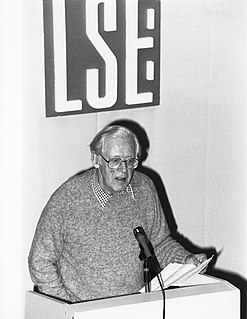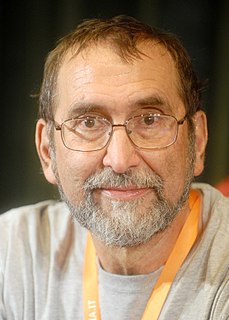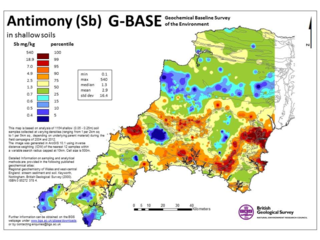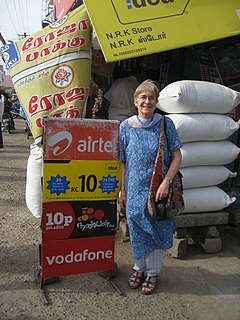Related Research Articles

Rodney Howard Hilton was an English Marxist historian of the late medieval period and the transition from feudalism to capitalism.

Alexander V. Chayanov was a Russian, then Soviet agrarian economist, scholar of rural sociology, and advocate of agrarianism and cooperatives. He was murdered by the Stalinist authorities.

An agrarian society, or agricultural society, is any community whose economy is based on producing and maintaining crops and farmland. Another way to define an agrarian society is by seeing how much of a nation's total production is in agriculture. In an agrarian society, cultivating the land is the primary source of wealth. Such a society may acknowledge other means of livelihood and work habits but stresses the importance of agriculture and farming. Agrarian societies have existed in various parts of the world as far back as 10,000 years ago and continue to exist today. They have been the most common form of socio-economic organization for most of recorded human history.
The history of capitalism is diverse. The concept of capitalism has many debated roots, but fully fledged capitalism is generally thought by scholars to have emerged in Northwestern Europe, especially in Great Britain and the Netherlands, in the 16th to 17th centuries. Over the following centuries, capital accumulated by a variety of methods, at a variety of scales, and became associated with much variation in the concentration of wealth and economic power. Capitalism gradually became the dominant economic system throughout the world. Much of the history of the past 500 years is concerned with the development of capitalism in its various forms.
Barbara Yorke FRHistS is a historian of Anglo-Saxon England, specialising in many subtopics, including 19th-century Anglo-Saxonism.
Richard John Toye is a British historian and academic. He is Professor of History at the University of Exeter. He was previously a Fellow and Director of Studies for History at Homerton College, University of Cambridge, from 2002 to 2007, and before that he taught at University of Manchester from 2000.
Robert Paul Brenner is a professor emeritus of history and director of the Center for Social Theory and Comparative History at UCLA, editor of the socialist journal Against the Current, and editorial committee member of New Left Review. His research interests are early modern European history, economic, social and religious history, agrarian history, social theory/Marxism, and Tudor–Stuart England.
Irene Joan Thirsk, was a British economic and social historian, specialising in the history of agriculture. She was the leading British early modern agrarian historian of her era, as well as an important social and economic historian. Her work highlighted the regional differences in agricultural in England. She also had an interest in food history and local English history, in particular of Hadlow, Kent.

Robert Carson Allen is Professor of Economic History at New York University Abu Dhabi. His research interests are economic history, technological change and public policy and he has written extensively on English agricultural history. He has also studied international competition in the steel industry, the extinction of Bowhead Whales in the Eastern Arctic, and contemporary policies on education.
Katherine Jane Humphries, CBE FBA, is a Fellow of All Souls College, University of Oxford with the Title of Distinction of professor of economic history. Her research interest has been in economic growth and development and the industrial revolution. She is the former president of the Economic History Society and the current vice-president of the Economic History Association.
J. Richard Peet is emeritus professor of human geography at the Graduate School of Geography at Clark University in Worcester MA, USA. Peet received a BSc (Economics) from the London School of Economics, an M.A. from the University of British Columbia, and moved to the USA in the mid-1960s to complete a PhD in Geography from the University of California, Berkeley. He began teaching at Clark University shortly after completing his PhD from Berkeley, and has remained there with secondments in Australia, Sweden and New Zealand. He is married to geographer Elaine Hartwick and lives in central Massachusetts.

Utsa Patnaik is an Indian Marxist economist. She taught at the Centre for Economic Studies and Planning in the School of Social Sciences at Jawaharlal Nehru University (JNU) in New Delhi, from 1973 until her retirement in 2010. Her husband is the Marxist economist Prabhat Patnaik.
Barbara Jane Elliott is a British sociologist and academic. She is Professor of Sociology at the University of Exeter. From October 2014 to September 2017 she was chief executive of the Economic and Social Research Council. Her research uses longitudinal, qualitative and quantitative methodologies to explore issues of gender and employment.
Alexandra Marie Walsham is an English-Australian academic historian. She specialises in early modern Britain and in the impact of the Protestant and Catholic reformations. Since 2010, she has been Professor of Modern History at the University of Cambridge and a Fellow of Trinity College, Cambridge. She is co-editor of Past & Present and Vice-President of the Royal Historical Society.
Sara Sweezy Berry is an American scholar of contemporary African political economies, professor of history at Johns Hopkins University and co-founder of the Center for Africana Studies at Johns Hopkins.

Jane Anne Plant CBE, FREng, FRSE, FRSA was a leading geochemist, scientist, and author. Plant was a pioneer in the field of geochemical surveys and environmental surveys. She was Chief Scientist at the British Geological Survey and was a Professor of Geochemistry at Imperial College London. Plant was also highly involved in the Institution of Mining & Metallurgy where she was involved in many aspects including a role on the Council, and was the first female President of the Institution of Mining & Metallurgy, a post she held from 2001 to 2002. This gave her an extensive network of key connections with government, industry and academia.
Bruce Mortimer Stanley Campbell, FBA, MRIA, MAE, FRHistS, FAcSS is a British economic historian. From 1995 to 2014, he was Professor of Medieval Economic History at Queen's University Belfast, where he remains an emeritus professor.
Mark Overton, FAcSS, is a British agricultural historian and formerly Professor of Economic and Social History at the University of Exeter, where he was Deputy Vice-Chancellor from 2006 to 2013.

Barbara Harriss-White is an English economist and emeritus professor of development studies. She was trained in geography, agricultural science, agricultural economics and self-taught in development economics. In the 1990s, she helped to create the multi- and inter- disciplinary thematic discipline of development studies in Oxford Department of International Development; and in 2005-7 founded Oxford's Contemporary South Asia Programme. She has developed an approach to the understanding of Indian rural development and its informal economy, grounded in political economy and decades of what the economic anthropologist Polly Hill called ‘field economics’.
Walter Edward Minchinton, FRHistS was a British historian and academic. He was Professor of Economic History at the University of Exeter from 1964 to 1986.
References
- ↑ "Professor Jane Whittle", University of Exeter. Retrieved 3 May 2018.
- ↑ "The development of agrarian capitalism in England from c. 1450–c. 1580", EthOS (British Library). Retrieved 3 May 2018.
- ↑ "Fellows – W", Royal Historical Society. Retrieved 3 May 2018.
